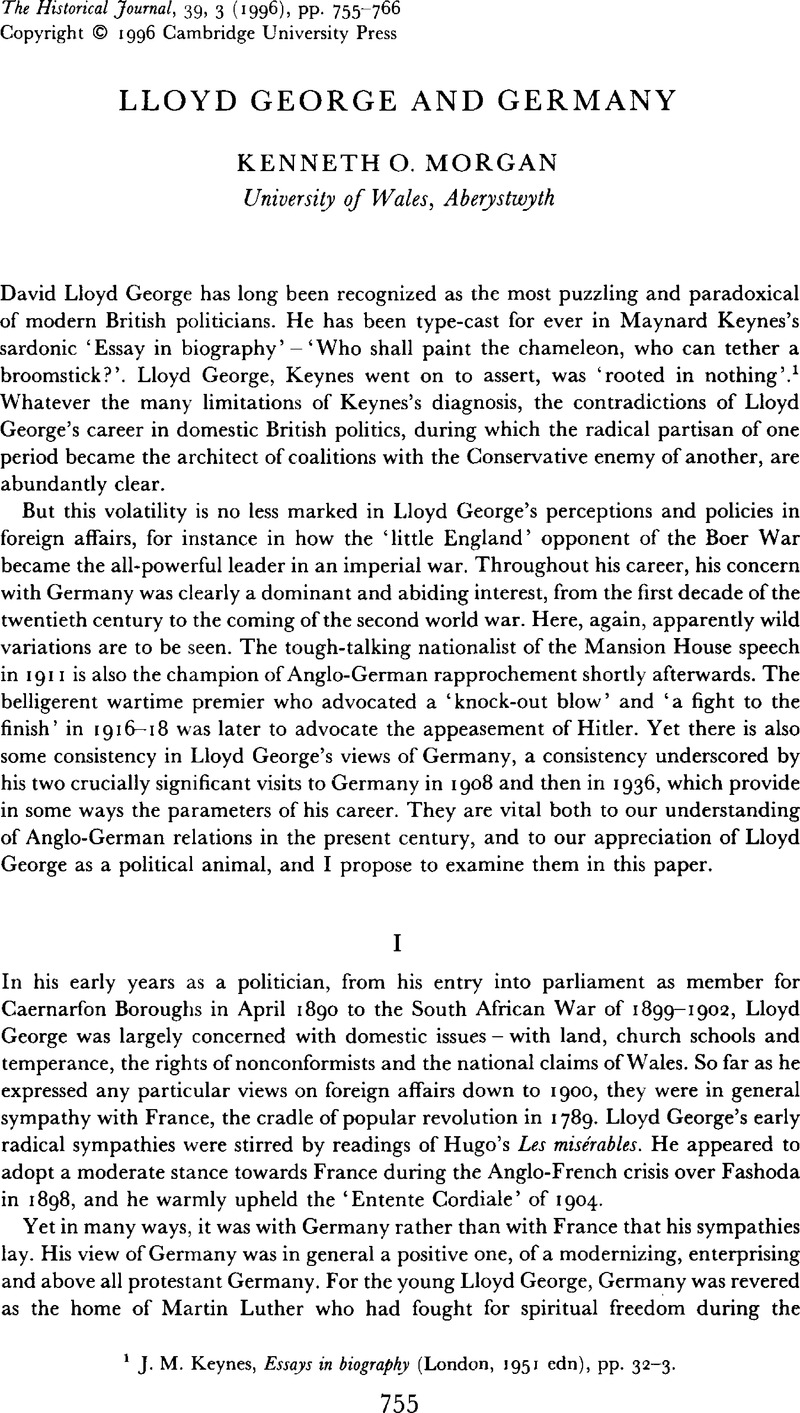Published online by Cambridge University Press: 11 February 2009

1 Keynes, J. M., Essays in biography (London, 1951 edn), pp. 32–3.Google Scholar
2 Burrow, J. W., A Liberal descent, Victorian historians and the English past (Cambridge 1983), pp. 116–22.Google Scholar
3 For a good general account, see Fry, Michael G., Lloyd George and foreign policy, I (Montreal, 1977).CrossRefGoogle Scholar
4 His Who's who entry said of Dawson, , ‘Most of his books have been written for the purpose of interpreting German thought, life and character to English people, and particularly of expounding German practice in the treatment of social and industrial questions…’.Google Scholar
5 Harold, Spender, The fire of life (London, n.d.), pp. 161–6Google Scholar. At Carlsbad, Lloyd George met Clemenceau for the first time.
6 Pari. Deb., 5th ser., XXV, 615–16 (4 May 1911).
7 Lloyd George was in touch with Theodore Roosevelt during the 1912 presidential campaign, cf. D. Lloyd George to Mrs Lloyd George, 16 Oct. 1912, in Morgan, Kenneth O. (ed.), Lloyd George: family letters, c. 1885–1936 (Oxford and Cardiff, 1973), p. 164.Google Scholar
8 Fair, John D., Interplay conferences (Oxford, 1980), pp. 91ff.Google Scholar
9 George, D. Lloyd, The truth about the peace treaties, I (London, 1938), 231–2.Google Scholar
10 Pari. Deb., 5th ser., XXV, 615–16, 638 (4 May 1911). See Hennock, E. P., British social reform and German precedents. The case of social insurance 1880–1914 (Oxford, 1987), pp. 180ff.Google Scholar
11 George, D. Lloyd, War memoirs (London, 1938), I, 8–16Google Scholar (with the Kaiser's annotations included).
12 Ibid. 18–19.
13 Taylor, A. J. P., The struggle for mastery in Europe, 1848–1918 (Oxford, 1954), p. 471.Google Scholar
14 There is a good discussion in Gilbert, Bentley Brinkerhoff, David Lloyd George, I. Organizer of victory, 1912–1916, (Columbus, Ohio, 1992), pp. 74–9.Google Scholar
15 The Times, 18 July 1914.
16 Ibid. 20 Sept. 1914.
17 See Morgan, Kenneth O., ‘Peace movements in Wales, 1899–1945’, Welsh History Review, X, 1 (1981), 406–7.Google Scholar
18 Notably in his interview with Roy Howard of the American United Press, published in The Times, 29 Nov. 1916.
19 Lloyd George's Bangor speech is printed in a volume of his speeches, Through terror to triumph (London, 1915), pp. 75–89.Google Scholar
20 Keynes, J. M., The economic consequences of the peace (London, 1919), pp. 127–33.Google Scholar
21 cf. Morgan, Kenneth O., Consensus and disunity. The Lloyd George coalition government, 1918–1922 (Oxford, 1986 edn), pp. 39–41.Google Scholar
22 Robert, Skidelsky, John Maynard Keynes, Vol. I, 1883–1920 (London 1983), pp. 358–61.Google Scholar
23 Morgan, Kenneth O., ‘Lloyd George's stage army: the coalition Liberals, 1918–22’, in Taylor, A. J. P. (ed.), Lloyd George: twelve essays (London, 1971), pp. 230–1Google Scholar. Also see H. A. L. Fisher to Lloyd George, 17 March 1919 (House of Lords Record Office, Lloyd George papers, F/16/7/39) in which Fisher warns against either Danzig or Posen being given to Poland.
24 See Lloyd, George, The truth about the peace treaties, I, 259–61.Google Scholar
25 See John, Turner, Lloyd George's secretariat (Cambridge, 1980), pp. 153ffGoogle Scholar. for Kerr's views.
26 It is printed in its entirety in Lloyd, George'sThe truth about the peace treaties, I, 403–16.Google Scholar
27 Keynes, J. M., The economic consequences of the peace (London, 1919), pp. 186–7Google Scholar. He added that Germany would not be able to pay this amount.
28 Lentin, A., Guilt at Versailles (London, 1985), pp. 101–4.Google Scholar
29 Ibid. pp. 84–8.
30 Lloyd, George, The truth about the peace treaties, I, p. 461.Google Scholar
31 ‘An entirely new kind of capitalist, dark and fanatical’: Philip Kerr to Lord Curzon, 25 June 1920 (PRO, FO/800/153), fos. 289–90.
32 For the Genoa conference, see Stephen, White, The origins of detente (Cambridge, 1985)Google Scholar. There is an interesting essay on Walter Rathenau in James, Joll, Intellectuals in politics (London, 1960), pp. 59ff.Google Scholar
33 See Lloyd George to Kingsley Martin, 28 March 1936 (House of Lords Record Office, Lloyd George papers, G/14/2/3).
34 Lloyd, George, The truth about the peace treaties, II, 930ff.Google Scholar
35 For this visit, see Thomas, Jones, A diary with letters, 1931–50 (Oxford, 1954), pp. 239–42Google Scholar, and Ellis, E. L., T. J. A life of Dr Thomas Jones CH (Cardiff, 1992), pp. 405–8Google Scholar, along with the pamphlet by Emrys, Pride, Why Lloyd George met Hitler (Newport, 1981).Google Scholar
36 Daily Express, 17 Sept. 1936.
37 Colin, Cross (ed.), A. J. Sylvester: life with Lloyd George (London, 1975), p. 219 (5 Oct. 1938)Google Scholar. See also Parker, R. A. C., Chamberlain and appeasement (London, 1993), pp. 315–16.CrossRefGoogle Scholar
38 See on this phase, Sidney, Aster, ‘Ivan Maisky and parliamentary anti-appeasement, 1938–9’, in Taylor, A. J. P. (ed.), Lloyd George: twelve essays, pp. 317ffGoogle Scholar. Maisky's estimation of Lloyd George dated from the moderate policy towards the Soviet Union that the British prime minister inaugurated in 1920–1. On his eightieth birthday in 1943, Lloyd George was told by Maisky ‘… in my estimation you are probably the outstanding statesman Great Britain has produced throughout his period’.
39 See Paul, Addison, ‘Lloyd George and a compromise peace in the second world war’, in Taylor, A. J . P. (ed.), Twelve essays, p. 361ff.Google Scholar
40 ‘Special Mission to Europe of Sumner Welles’, Foreign relations of the United States, Diplomatic papers, 1940 (Washington), pp. 85–6.Google Scholar
41 Taylor, A. J. P. (ed.), Lloyd George, a diary by Frances Stevenson (London, 1971), pp. 256–7 (21 02 1934)Google Scholar ‘We should keep a strong hand in India’, observed Lloyd George. Also ibid. pp. 272–3 (14 May 1934).